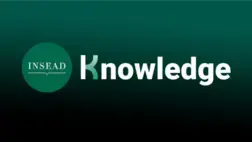Our purpose
In the Spotlight

Paris 2024: A Model for Greener Games

Designing a Circular Business Strategy That Works

INSEAD Knowledge: SBI Series
Activities
Our main activity is building content based on solid research. Our aim is to make INSEAD a reference in business sustainability research. As such, the Initiative will:
- Foster critical, independent research on integrating sustainability in businesses and policy making.
- Invite and enable research in Sustainability from faculty in all nine disciplines covering all aspects of business: Accounting and Control, Decision Sciences, Economics and Political Science, Finance, Marketing, Organisational Behaviour, Strategy and Technology and Operations Management.
- Enable further industry interaction to keep a pulse on emerging issues.
- Disseminate output extensively to share insights and promote the school’s mission of building business as a force for good.
Research topics
With adequate resources, the Initiative will be able to advance collaborative and inclusive research. Some examples are:
Environmentally Focused Research Topics
- Circular Economy: How do we create industrial systems that maximize resource efficiency and minimize pollution?
- Sustainable Innovation: How do we design products and processes that help protect the environment? How can we redesign the industrial ecosystems and cities to create a better world?
- Sustainable Investing: What is the link between an organization’s environmental impact performance and its valuation? Can stakeholder and shareholder views of capitalism be aligned?
- Habits and Sustainability: How do the ways consumers form habits affect their environmentally responsible behavior?
Environmental and Social
- Sustainable Agriculture: Can we design industrial and small-scale agricultural systems in a way that it helps improve the well-being of developing economies, improve the condition of natural ecosystems, and limit resource scarcity?
- Responsible Analytics: Can we use the new analytical tools (e.g., machine learning and artificial intelligence) and our access to big data to help protect the environment and the underserved populations.
- Sustainable Innovation: Can we rethink industrial design from scratch? Is there a way we can transform pollution into value?
Social
- Not-for-profit Operations: How does an operations perspective help improve the effectiveness of not-for-profit organizations? How are these entities different from for-profit organizations from a system design perspective?
- Humanitarian Operations: What are the best practices to serve the underprivileged in developing economies? How can academia and large humanitarian organizations (e.g., Red Cross, World Food Programme) collaborate on the ground?
- Social Entrepreneurship and Impact: What is impact in a social context? How can entrepreneurs create businesses that not only help serve the underprivileged and also create value?
- Measurement and Reporting in Sustainability: How do we quantify and assess sustainability performance?
Governance and Social
- Ethical Artificial Intelligence: Do algorithms pay attention to treating customers/businesses/managers fairly? How do we measure and correct any algorithmic biases in artificial intelligence?
- Governance and Fair Process: How do we create fair processes in the executive suite and the board room?
The landscape of INSEAD’s education in Sustainability is changing with the introduction of new curricula and programmes.
In degree programmes, faculty are reviewing the MBA curriculum to strengthen Sustainability in its core courses. Professor Atalay Atasu, currently teaching the elective Business Sustainability Thinking in MBA and Master-in-Management (MIM) programmes, is a member of the review committee.
The Executive Education Programme is being boosted by a new Open Enrolment Programme entitled the INSEAD Business Sustainability Programme. It is an example of viewing Sustainability from Operations, Strategy, Finance and Accounting. Co-directed by Atalay Atasu and Professor Karel Cool from Strategy, the programme is also taught by Professors Lucie Tepla (Finance) and Peter Joos (Accounting).
Equally, there is work-in-progress in online education. Atalay Atasu and Lucie Tepla are creating a certificate programme for a large audience. The directors are bringing in almost 20 faculty across all nine disciplines, leveraging their research and case studies to create a unique and distinct Sustainable Programme.
There is a great demand for education in Sustainability from the corporate world. Appropriate funding would help to innovate and develop new curriculum content, case studies and other pedagogical material, grounded in research. The examples above show the inclusive cross-disciplinary approach being taken.
Our goal is to expand the community of thinkers in the Sustainability field by growing the community of Researchers and supporting young scholars in their Research projects.









